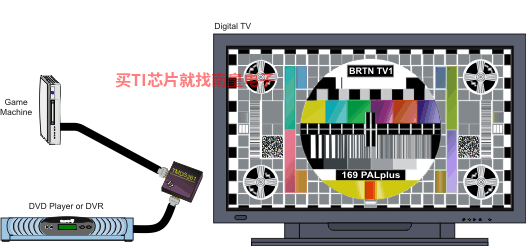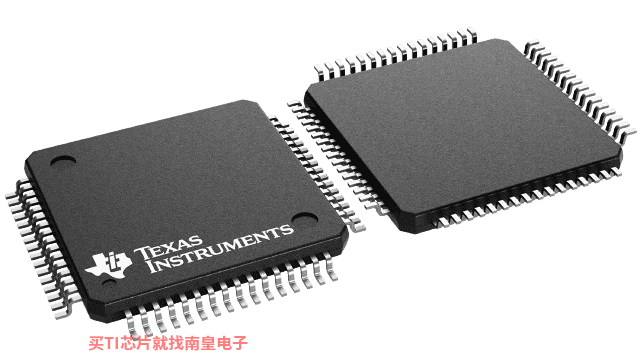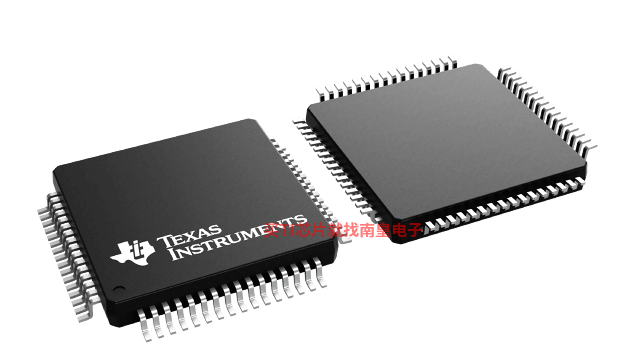
- 制造厂商:TI
- 产品类别:接口
- 技术类目:HDMI、DisplayPort 和 MIPI IC
- 功能描述:具有自适应均衡功能的 3Gbps 2 至 1 HDMI/DVI 多路复用器
- 点击这里打开及下载TMDS261B的技术文档资料
- TI代理渠道,提供当日发货、严格的质量标准,满足您的目标价格

The TMDS261B is a two-port digital video interface (DVI) or high-definition multimedia interface (HDMI) switch that allows up to two DVI or HDMI ports to be switched to a single display terminal. Four TMDS channels, one hot-plug detector, and a digital display control (DDC) interface are supported on each port. Each TMDS channel supports signaling rates up to 3 Gbps to allow 1080p resolution in 16-bit color depth. TMDS261B device is not intended for source side applications such as external switch boxes
The TMDS261B provides an adaptive equalizer for different ranges of cable lengths. The equalizer automatically compensates for intersymbol interference [ISI] loss of an HDMI/DVI cable for up to 20 dB at 3 Gbps (see ).
DLP is a trademark of Texas Instruments.
When any of the input ports are selected, the integrated terminations (50-Ω termination resistors pulled up to VCC) are switched on for the TMDS clock channel, the TMDS clock-detection circuit is enabled, and the DDC repeater is enabled. After a valid TMDS clock is detected, the integrated termination resistors for the data lines are enabled, and the output TMDS lines are enabled. When an input port is not selected, the integrated terminations are switched off, the TMDS receivers are disabled, and the DDC repeater is disabled. Clock-detection circuitry provides an automatic power-management feature, because if no valid TMDS clock is detected, the terminations on the input TMDS data lines are disconnected and the TMDS outputs are placed in a high-impedance state.
The TMDS261B is designed to be controlled via a local I2C interface or GPIO interface, based on the status of the I2C_SEL pin. The local I2C interface in TMDS261B is a slave-only I2C interface. (See the section.)
I2C Mode: When the I2C_SEL pin is set low, the device is in I2C mode. With local I2C, the interface port status can be read, and the advanced configurations of the device such as TMDS output edge rate control, DDC I2C buffer output-voltage-select (OVS) settings (See the for detailed description on DDC I2C buffer description and OVS description), device power management, TMDS clock-detect feature, and TMDS input-port selection can be set..
GPIO mode: When the I2C_SEL pin is set high, the device is in GPIO control mode. The port selection is controlled with source selectors, S1 and S2. The power-saving mode is controlled through the LP pin. In GPIO mode, the default TMDS output edge rate that is the fastest setting of rise and fall time is set, and the default DDC I2C buffer OVS setting (OVS3) is set. See and the for a detailed description of the DDC I2C buffer.
Following are some of the key features (advantages) that the TMDS261B provides to the overall sink-side system (HDTV).
- 2×1 switch that supports TMDS data rates up to 3 Gbps on both input ports.
- ESD: Built-in support for high ESD protection (up to 10 kV on the HDMI source side). The HDMI source-side pins on the TMDS261B are connected via the HDMI/DVI exterior connectors and cable to the HDMI/DVI sources (e.g., DVD player). In TV applications, it can be expected that the source side may be subjected to higher ESD stresses compared to the sink side that is connected internally to the HDMI receiver.
- Adaptive equalization: The built-in adaptive equalization support compensates for intersymbol interference [ISI] loss of up to 20 dB, which represents a typical 20-m HDMI/DVI cable at 3 Gbps. Adaptive equalization adjusts the equalization gain automatically, based on the cable length and the incoming TMDS data rate.
- TMDS clock-detect circuitry: This feature provides an automatic power-management feature and also ensures that the TMDS output port is turned on only if there is a valid TMDS input signal. The TMDS clock-detect feature can be by-passed in I2C mode; see and . It is recommended to enable TMDS clock-detect circuitry during normal operation. However, for HDMI compliance testing (TMDS termination-voltage test), the clock-detect feature should be disabled by using the I2C mode control. If the customer requires passing the TMDS termination-voltage test in the GPIO mode with the default TMDS clock-detect circuitry enabled, then a valid TMDS clock should be provided for this compliance test, so that the terminations on the TMDS data pair can be connected and thus customer can pass the TMDS termination-voltage test.
- DDC I2C buffer: This feature provides isolation on the source-side and sink-side DDC I2C capacitance, thus helping the sink system to pass system-level compliance.
- Robust TMDS receive stage: This feature ensures that the TMDS261B can work with TMDS input signals having common-mode voltage levels that can be either compliant or non-compliant with HDMI/DVI specifications.
- VSadj: This feature adjusts the TMDS output swing and can help the sink system to tune the output TMDS swing of the TMDS261B (if needed) based on the system requirements.
- GPIO or local I2C interface to control the device features
- TMDS output edge-rate control: This feature adjusts the TMDS261B TMDS output rise and fall times. There are four settings of the rise and fall times that can be chosen. The default setting is the fastest rise and fall time; the other three settings are slower. Slower edge transitions can potentially help the sink system (HDTV) in passing regulatory EMI compliance.
- 2:1 Sink-side switch Supporting DVI Above 1920 × 1200 and HDMI HDTV Resolutions up to 1080p With 16-Bit Color Depth
- Designed for Signaling Rates up to 3 Gbps
- Supports HDMI 1.3a Specification
- Adaptive Equalization on inputs to support up to 20-m HDMI Cable at 2.25 Gbps for 1080p 12-Bit Color Depth
- TMDS Input Clock-Detect Circuit
- DDC Repeater Function
- <2-mW Low-Power Mode
- Local I2C or GPIO Configurable
- Enhanced ESD. HBM: 10 kV on All Input TMDS, DDC I2C, HPD Pins
- 3.3-Volt Power Supply
- Temperature Range: 0°C to 70°C
- 64-Pin TQFP Package: Pin-Compatible With TMDS251
- Robust TMDS Receive Stage That Can Work With Non-Compliant Input Common-Mode HDMI Signal
- APPLICATIONS
- High-Definition Digital TV
- LCD
- Plasma
- DLP
- High-Definition Digital TV
DLP is a trademark of Texas Instruments.
- Protocols
- HDMI
- Speed (Max) (Gbps)
- 3
- Supply voltage (V)
- 3.3
- Operating temperature range (C)
- 0 to 70
TMDS261B的完整型号有:TMDS261BPAG、TMDS261BPAGR,以下是这些产品的关键参数及官网采购报价:
TMDS261BPAG,工作温度:0 to 70,封装:TQFP (PAG)-64,包装数量MPQ:160个,MSL 等级/回流焊峰值温度:Level-3-260C-168 HR,引脚镀层/焊球材料:NIPDAU,TI官网TMDS261BPAG的批量USD价格:1.485(1000+)
TMDS261BPAGR,工作温度:0 to 70,封装:TQFP (PAG)-64,包装数量MPQ:1500个,MSL 等级/回流焊峰值温度:Level-3-260C-168 HR,引脚镀层/焊球材料:NIPDAU,TI官网TMDS261BPAGR的批量USD价格:1.247(1000+)

PSPICE-FOR-TI — 适用于 TI 设计和模拟工具的 PSpice
PSpice for TI 可提供帮助评估模拟电路功能的设计和仿真环境。此功能齐全的设计和仿真套件使用 Cadence 的模拟分析引擎。PSpice for TI 可免费使用,包括业内超大的模型库之一,涵盖我们的模拟和电源产品系列以及精选的模拟行为模型。借助?PSpice for TI 的设计和仿真环境及其内置的模型库,您可对复杂的混合信号设计进行仿真。创建完整的终端设备设计和原型解决方案,然后再进行布局和制造,可缩短产品上市时间并降低开发成本。
在?PSpice for TI 设计和仿真工具中,您可以搜索 TI (...)
TINA-TI — 基于 SPICE 的模拟仿真程序
TINA-TI 提供了 SPICE 所有的传统直流、瞬态和频域分析以及更多。TINA 具有广泛的后处理功能,允许您按照希望的方式设置结果的格式。虚拟仪器允许您选择输入波形、探针电路节点电压和波形。TINA 的原理图捕获非常直观 - 真正的“快速入门”。TINA-TI 安装需要大约 500MB。直接安装,如果想卸载也很容易。我们相信您肯定会爱不释手。
TINA 是德州仪器 (TI) 专有的 DesignSoft 产品。该免费版本具有完整的功能,但不支持完整版 TINA 所提供的某些其他功能。
如需获取可用 TINA-TI 模型的完整列表,请参阅:SpiceRack - 完整列表
需要 HSpice (...)







